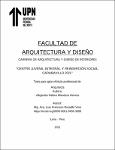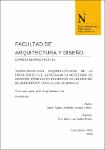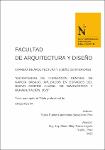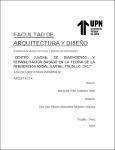Mostrar el registro sencillo del ítem
Centro juvenil integral y reinserción social. Carabayllo 2021
| dc.contributor.advisor | Rosselló Vera, Luis Francisco | |
| dc.contributor.author | Mendoza Herrera, Alejandra Helene | |
| dc.date.accessioned | 2024-02-01T21:00:21Z | |
| dc.date.available | 2024-02-01T21:00:21Z | |
| dc.date.issued | 2023-08-11 | |
| dc.identifier.citation | Mendoza, A. H. (2021). Centro juvenil integral y reinserción social. Carabayllo 2021 [Tesis de licenciatura, Universidad Privada del Norte]. Repositorio de la Universidad Privada del Norte. https://hdl.handle.net/11537/35783 | es_PE |
| dc.identifier.other | 725.87 MEND 2023 | es_PE |
| dc.identifier.uri | https://hdl.handle.net/11537/35783 | |
| dc.description.abstract | La presente tesis tiene como objetivo, por medio de la infraestructura, mejorar la calidad de vida de los menores infractores que se encuentren recluidos en el Centro Juvenil de Diagnóstico y Rehabilitación de Lima, de tal manera que se logre un mejor resultado en su proceso de reinserción social. Por tal motivo, se demuestra que el Centro Juvenil Integral mantiene una relación significativa con la reinserción social de los menores en conflicto con la ley penal. Se utiliza el diseño de investigación de tipo No experimental, de diseño transversal teniendo como muestra un total de 261 personas encuestadas, entre ellos menores infractores, docentes, asistentes sociales, psicólogos y policía nacional del Perú. De esta manera se concluye que el proyecto de centro juvenil integral cumple con la función de aportar a la reinserción social de los menores infractores por medio de los espacios arquitectónicos, dichos espacios son resultado del análisis del desarrollo cognitivo, desarrollo emocional y educativo de los menores, teniendo como resultado un proyecto arquitectónico acorde a las necesidades del usuario. Es por ello que se recomienda de manera fundamental, investigar las necesidades del usuario y a su vez realizar un análisis del sector en donde se encontrará el proyecto arquitectónico, debido a que es importante que la arquitectura responda a la necesidad del sujeto, pero a su vez no debe dejar de lado el entorno que lo rodea logrando así una condición de pertenencia ya que estará diseñado para funcionar en un lugar en específico. | es_PE |
| dc.description.abstract | The objective of this thesis is to improve the quality of life of juvenile offenders held in the Juvenile Diagnostic and Rehabilitation Center of Lima through infrastructure, in order to achieve better results in their social reintegration process. For this reason, it is shown that the Comprehensive Juvenile Center has a significant relationship with the social reintegration of minors in conflict with the criminal law. A non-experimental, cross-sectional research design was used, with a total sample of 261 people surveyed, including juvenile offenders, teachers, social workers, psychologists and the Peruvian National Police. Thus, it is concluded that the integral juvenile center project fulfills the function of contributing to the social reintegration of juvenile offenders through architectural spaces, such spaces are the result of the analysis of the cognitive development, emotional and educational development of minors, resulting in an architectural project according to the user's needs. That is why it is fundamentally recommended to investigate the user's needs and at the same time to analyze the sector where the architectural project will be located, because it is important that the architecture responds to the needs of the subject, but at the same time it should not neglect the surrounding environment, thus achieving a condition of belonging, since it will be designed to function in a specific place. | es_PE |
| dc.description.uri | Tesis | es_PE |
| dc.format | application/pdf | es_PE |
| dc.format | application/msword | es_PE |
| dc.language.iso | spa | es_PE |
| dc.publisher | Universidad Privada del Norte | es_PE |
| dc.rights | info:eu-repo/semantics/openAccess | es_PE |
| dc.rights | Atribución-NoComercial-CompartirIgual 3.0 Estados Unidos de América | * |
| dc.rights.uri | https://creativecommons.org/licenses/by-nc-sa/3.0/us/ | * |
| dc.source | Universidad Privada del Norte | es_PE |
| dc.source | Repositorio Institucional - UPN | es_PE |
| dc.subject | Centros juveniles | es_PE |
| dc.subject | Integración social | es_PE |
| dc.subject | Desarrollo cognitivo | es_PE |
| dc.subject | Desarrollo emocional | es_PE |
| dc.subject | Juvenile center | es_PE |
| dc.subject | Social reintegration | es_PE |
| dc.subject | Cognitive development | es_PE |
| dc.subject | Emotional development | es_PE |
| dc.title | Centro juvenil integral y reinserción social. Carabayllo 2021 | es_PE |
| dc.type | info:eu-repo/semantics/bachelorThesis | es_PE |
| thesis.degree.grantor | Universidad Privada del Norte. Facultad de Arquitectura y Diseño | es_PE |
| thesis.degree.level | Título Profesional | es_PE |
| thesis.degree.discipline | Arquitectura y Diseño de Interiores | es_PE |
| thesis.degree.name | Arquitecto | es_PE |
| dc.publisher.country | PE | es_PE |
| dc.subject.ocde | https://purl.org/pe-repo/ocde/ford#6.04.08 | es_PE |
| thesis.degree.program | Pregrado | es_PE |
| dc.description.sede | Comas | es_PE |
| renati.advisor.dni | 09165428 | |
| renati.advisor.orcid | https://orcid.org/0000-0001-9436-3088 | es_PE |
| renati.author.dni | 74130975 | |
| renati.discipline | 731106 | es_PE |
| renati.juror | Retamozo Hidalgo, Marcos Enrique | |
| renati.juror | Cerna Sifuentes, Carlos Alfonso | |
| renati.juror | Ruiz Zelada, Dante | |
| renati.level | http://purl.org/pe-repo/renati/level#tituloProfesional | es_PE |
| renati.type | http://purl.org/pe-repo/renati/type#tesis | es_PE |
| dc.relation.conformsto | 20% | es_PE |
Ficheros en el ítem
Este ítem aparece en la(s) siguiente(s) colección(ones)
-
Tesis [216]










